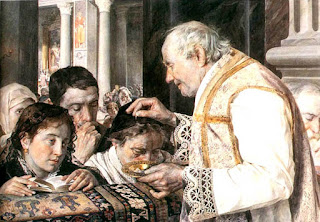Remembering that We Are Dust

Spending Ash Wednesday ill in bed, I was unable to write an appropriate reflection for the Fellowship, or even attend mass. The only devotion I managed was reciting Psalm 103 in my little Authorized Version psalm book. Of course, I chose this psalm because I remembered that it echoed the line from Genesis, "Dust you are and to dust you shall return." (Gen. 3:19) Imagine my surprise, then, to realize when I reached verse 14 that in fact it read, "For he knoweth our frame; he remembereth that we are dust." Polish priest imposing ashes (unknown, 1881) The Psalmist has taken a refrain from throughout the Old Testament, a reminder to mankind that we are mortal, that we are sinful, and that we must act accordingly, (see Eccl. 5:15, Ps. 104:29, Isa. 40, and Ps. 90) and turned it on its head. There is more to "Ashes to ashes and dust to dust" than only the command to "redeem the time, because the days are evil." (Eph. 5:16) There is another side: t...
